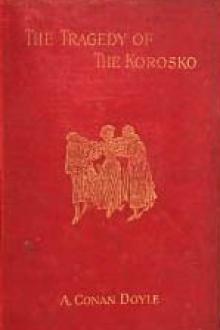The Tragedy of the Korosko, Arthur Conan Doyle [different e readers .txt] 📗

- Author: Arthur Conan Doyle
- Performer: -
Book online «The Tragedy of the Korosko, Arthur Conan Doyle [different e readers .txt] 📗». Author Arthur Conan Doyle
"Don't be frightened, ladies," cried the Colonel. "He is quite dead, I assure you. I am so sorry to have done this in your presence, but the fellow was dangerous. I had a little score of my own to settle with him, for he was the man who tried to break my ribs with his Remington. I hope you are not hurt, Miss Adams! One instant, and I will come down to you."
But the old Boston lady was by no means hurt, for the rocks had been so high that she had a very short distance to fall from her saddle. Sadie, Mrs. Belmont, and Colonel Cochrane had all descended by slipping on to the boulders and climbing down from them. But they found Miss Adams on her feet, and waving the remains of her green veil in triumph.
"Hurrah, Sadie! Hurrah, my own darling Sadie!" she was shrieking.
"We are saved, my girl, we are saved after all."
"By George, so we are!" cried the Colonel, and they all shouted in an ecstasy together.
But Sadie had learned to think more about others during those terrible days of schooling. Her arms were round Mrs. Belmont, and her cheek against hers.
"You dear, sweet angel," she cried, "how can we have the heart to be glad when you—when you—"
"But I don't believe it is so," cried the brave Irishwoman. "No, I'll never believe it until I see John's body lying before me. And when I see that, I don't want to live to see anything more."
The last Dervish had clattered down the khor, and now above them on either cliff they could see the Egyptians—tall, thin, square shouldered figures, looking, when outlined against the blue sky, wonderfully like the warriors in the ancient bas-reliefs. Their camels were in the background, and they were hurrying to join them. At the same time others began to ride down from the farther end of the ravine, their dark faces flushed and their eyes shining with the excitement of victory and pursuit. A very small Englishman, with a straw-coloured moustache and a weary manner, was riding at the head of them. He halted his camel beside the fugitives and saluted the ladies. He wore brown boots and brown belts with steel buckles, which looked trim and workmanlike against his khaki uniform.
"Had 'em that time—had 'em proper!" said he. "Very glad to have been of any assistance, I'm sure. Hope you're none the worse for it all. What I mean, it's rather rough work for ladies."
"You're from Halfa, I suppose?" asked the Colonel.
"No, we're from the other show. We're the Sarras crowd, you know. We met in the desert, and we headed 'em off, and the other Johnnies herded 'em behind. We've got 'em on toast, I tell you. Get up on that rock and you'll see things happen. It's going to be a knockout in one round this time."
"We left some of our people at the Wells. We are very uneasy about them," said the Colonel. "I suppose you haven't heard anything of them?"
The young officer looked serious and shook his head. "Bad job that!" said he. "They're a poisonous crowd when you put 'em in a corner. What I mean, we never expected to see you alive, and we're very glad to pull any of you out of the fire. The most we hoped was that we might revenge you."
"Any other Englishman with you?"
"Archer is with the flanking party. He'll have to come past, for I don't think there is any other way down. We've got one of your chaps up there—a funny old bird with a red top-knot. See you later, I hope! Good day, ladies!" He touched his helmet, tapped his camel, and trotted on after his men.
"We can't do better than stay where we are until they are all past," said the Colonel, for it was evident now that the men from above would have to come round. In a broken single file they went past, black men and brown, Soudanese and fellaheen, but all of the best, for the Camel Corps is the corps d'elite of the Egyptian army. Each had a brown bandolier over his chest and his rifle held across his thigh. A large man with a drooping black moustache and a pair of binoculars in his hand was riding at the side of them. "Hulloa, Archer!" croaked the Colonel. The officer looked at him with the vacant, unresponsive eye of a complete stranger.
"I'm Cochrane, you know! We travelled up together."
"Excuse me, sir, but you have the advantage of me," said the officer. "I knew a Colonel Cochrane Cochrane, but you are not the man. He was three inches taller than you, with black hair and—"
"That's all right," cried the Colonel testily. "You try a few days with the Dervishes, and see if your friends will recognise you!"
"Good God, Cochrane, is it really you? I could not have believed it. Great Scott, what you must have been through! I've heard before of fellows going grey in a night, but, by Jove—"
"Quite so," said the Colonel, flushing.
"Allow me to hint to you, Archer, that if you could get some food and drink for these ladies, instead of discussing my personal appearance, it would be much more practical."
"That's all right," said Captain Archer. "Your friend Stuart knows that you are here, and he is bringing some stuff round for you. Poor fare, ladies, but the best we have! You're an old soldier, Cochrane. Get up on the rocks presently, and you'll see a lovely sight. No time to stop, for we shall be in action again in five minutes. Anything I can do before I go?"
"You haven't got such a thing as a cigar?" asked the Colonel wistfully.
Archer drew a thick satisfying partaga from his case, and handed it down, with half-a-dozen wax vestas. Then he cantered after his men, and the old soldier leaned back against the rock and drew in the fragrant smoke. It was then that his jangled nerves knew the full virtue of tobacco, the gentle anodyne which stays the failing strength and soothes the worrying brain. He watched the dim blue reek swirling up from him, and he felt the pleasant aromatic bite upon his palate, while a restful languor crept over his weary and harassed body. The three ladies sat together upon a flat rock.
"Good land, what a sight you are, Sadie!" cried Miss Adams suddenly, and it was the first reappearance of her old self. "What would your mother say if she saw you? Why, sakes alive, your hair is full of straw and your frock clean crazy!"
"I guess we all want some setting to rights," said Sadie, in a voice which was much more subdued than that of the Sadie of old. "Mrs. Belmont, you look just too perfectly sweet anyhow, but if you'll allow me I'll fix your dress for you."
But Mrs. Belmont's eyes were far away, and she shook her head sadly as she gently put the girl's hands aside.
"I do not care how I look. I cannot think of it," said she; "could you, if you had left the man you love behind you, as I have mine?"
"I'm begin—beginning to think I have," sobbed poor Sadie, and buried her hot face in Mrs. Belmont's motherly bosom.
CHAPTER X.The Camel Corps had all passed onwards down the khor in pursuit of the retreating Dervishes, and for a few minutes the escaped prisoners had been left alone. But now there came a cheery voice calling upon them, and a red turban bobbed about among the rocks, with the large white face of the Nonconformist minister smiling from beneath it. He had a thick lance with which to support his injured leg, and this murderous crutch combined with his peaceful appearance to give him a most incongruous aspect—as of a sheep which has suddenly developed claws. Behind him were two negroes with a basket and a water-skin.
"Not a word! Not a word!" he cried, as he stumped up to them. "I know exactly how you feel. I've been there myself. Bring the water, Ali! Only half a cup, Miss Adams; you shall have some more presently. Now your turn, Mrs. Belmont! Dear me, dear me, you poor souls, how my heart does bleed for you! There's bread and meat in the basket, but you must be very moderate at first." He chuckled with joy, and slapped his fat hands together as he watched them.
"But the others?" he asked, his face turning grave again.
The Colonel shook his head. "We left them behind at the wells. I fear that it is all over with them."
"Tut, tut!" cried the clergyman, in a boisterous voice, which could not cover the despondency of his expression; "you thought, no doubt, that it was all over with me, but here I am in spite of it. Never lose heart, Mrs. Belmont. Your husband's position could not possibly be as hopeless as mine was."
"When I saw you standing on that rock up yonder, I put it down to delirium," said the Colonel. "If the ladies had not seen you, I should never have ventured to believe it."
"I am afraid that I behaved very badly. Captain Archer says that I nearly spoiled all their plans, and that I deserved to be tried by a drumhead court-martial and shot. The fact is that, when I heard the Arabs beneath me, I forgot myself in my anxiety to know if any of you were left."
"I wonder that you were not shot without any drumhead court-martial," said the Colonel. "But how in the world did you get here?"
"The Halfa people were close upon our track at the time when I was abandoned, and they picked me up in the desert. I must have been delirious, I suppose, for they tell me that they heard my voice, singing hymns, a long way off, and it was that, under the providence of God, which brought them to me. They had a camel ambulance, and I was quite myself again by next day. I came with the Sarras people after we met them, because they have the doctor with them. My wound is nothing, and he says that a man of my habit will be the better for the loss of blood. And now, my friends"—his big, brown eyes lost their twinkle, and became very solemn and reverent—"we have all been upon the very confines of death, and our dear companions may be so at this instant. The same Power which saved us may save them, and let us pray together that it may be so, always remembering that if, in spite of our prayers, it should not be so, then that also must be accepted as the best and wisest thing."
So they knelt together among the black rocks, and prayed as some of them had never prayed before. It was very well to discuss prayer and treat it lightly and philosophically upon the deck of the Korosko. It was easy to feel strong and self-confident in the comfortable deck-chair, with the slippered Arab handing round the coffee and liqueurs. But they had





Comments (0)